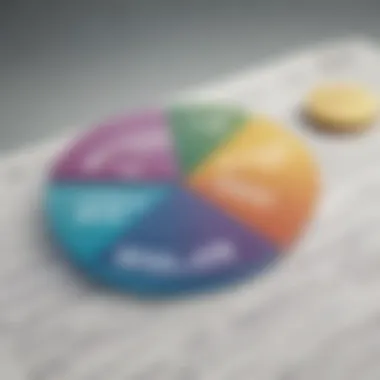Effective Strategies to Eliminate Debt and Boost Credit


Intro
Navigating the choppy waters of personal finance can often feel like walking a tightrope. On one hand, you might find yourself buried under a mountain of debt, while on the other, your credit score hangs in the balance—like a feather swaying in the wind. This article serves as a roadmap, guiding you through effective strategies to both eliminate debt and enhance your credit score.
People face various types of debts, from student loans to credit card balances; each union brings its own set of challenges. By understanding how to tackle these debts while simultaneously playing the credit score game, individuals can position themselves for a much more stable financial future. It’s never too late to make the jump from financial turmoil to serene stability with the right mindset and approach.
Here, we dive into practical tips that not only lessen the financial burden but also contribute to improving thosenscoring numbers that can either open doors or close them entirely. So, whether you are an investor looking to refine your portfolio or a student striving to understand the basics of credit, keep reading as we unravel this complex web of financial management.
Investment Terminology Basics
Understanding the fundamentals of financial literacy is key to addressing debt and credit scores effectively. Familiarity with common terms can empower you to make informed decisions.
Key Terms Explained
- Debt-to-Income Ratio: This ratio helps lenders assess your ability to manage monthly payments and repay debts. It’s calculated by dividing total monthly debt payments by gross monthly income. Keeping this low is essential.
- Credit Utilization Rate: This refers to the amount of credit you're using compared to your overall credit limit. Keeping it under 30% is generally recommended to maintain a good score.
- FICO Score: The most commonly used credit score in lending decisions, this three-digit number is heavily influenced by payment history and credit utilization, among other factors.
- Collections: When debts are not paid, they can be sent to collections agencies. This can severely damage your credit score.
Common Investment Strategies
Understanding how to invest wisely can also aid your financial journey verso eliminating debt. Here are some tactics:
- Debt Snowball Method: Focus on paying off your smallest debts first. The sense of achievement can motivate larger payments on remaining debts.
- Debt Avalanche Method: Prioritize debts with the highest interest rates. This approach saves money in the long run by reducing interest payments.
- Setting Up an Emergency Fund: Having a cushion can prevent new debt from accruing when unexpected expenses arise.
- Automatic Payments: Setting up auto-pay on bills can help avoid late fees and protect your credit.
In summary, grasping key concepts around debt management and credit scores acts as a bedrock to begin modifying your financial landscape.
"Understanding the language of finance is not just empowering; it’s essential for those who wish to succeed in managing their financial health."
Through thorough research and practical implementation options, you can navigate your way toward financial peace.
Next, we will delve deeper into Financial Product Reviews, offering insights that will help you decide the best financial products for managing debt effectively.
Understanding Debt and Credit Score
Understanding debt and credit scores is crucial for anyone who navigates the complex waters of personal finance. The interplay between these two elements impacts not only your financial stability but also the way lenders view you. This section shines a light on the essentials of debt management and credit evaluation.
Defining Debt
Debt can be defined as an amount of money borrowed by one party from another. It's a tool that can help individuals or businesses fund opportunities but, if not managed wisely, can lead to significant stress and financial strain. From student loans to credit card balances, debt manifests in various forms, each carrying its own terms and implications.
Understanding how debt operates is key. For instance, the interest rates, repayment schedules, and the reasons behind accumulating debt all play a part in how it affects one's financial health. A person might approach debt as a temporary obligation, but lack of planning can convert it into a long-term burden that feels heavy as a ton of bricks. It's vital to recognize the source and type of debt to create effective strategies for elimination.
What is a Credit Score?
A credit score is numerical representation of a person's creditworthiness, derived from their credit history. These scores typically range from 300 to 850, with higher scores indicating better reliability to lenders. Understanding your credit score isn't just a statistic; it's a reflection of your financial behavior over time. When you apply for loans or credit, lenders analyze your credit score to gauge the risk of lending to you.
Several factors influence credit scores, including payment history, the amounts owed, length of credit history, credit mix, and new credit inquiries. Each of these elements has its own weight, meaning a slight shift in one could swing your score substantially.
The Relationship Between Debt and Credit Scores
The relationship between debt and credit scores is a tight-knit one. More debt, especially if it's not managed well, can lead to a drop in your credit score. Missing payments, high balances relative to your credit limits, or frequent applications for new credit can signal distress to lenders, adversely affecting your score.
Conversely, when debt is handled skillfully—through timely payments and maintaining a low credit utilization ratio—your credit score can improve over time. This highlights the importance of understanding not only how to pay off debt, but also how those payments influence your credit standing.
"Managing your debt isn't just about paying it off; it's about making choices that keep your credit score in good health."
Grasping these concepts fundamentally equips individuals with the knowledge to better their financial situation. It’s essential for setting up goals and strategies that work toward eliminating debt and improving one’s credit score.
Assessing Your Financial Situation
Assessing your financial situation is akin to taking a full diagnostic of your health before heading to the gym. It sets the stage for all subsequent actions in the journey toward eliminating debt and enhancing credit scores. Without a clear understanding of where you stand financially, making informed decisions becomes a wild guess game. This foundational assessment provides visibility into your income, expenses, and financial obligations, creating a roadmap for effective debt management.
Taking stock of your overall financial health not only keeps you on track, but it also empowers you to set realistic goals that reflect your circumstances. Engaging in this process allows you to identify areas you can improve and highlights any potential pitfalls. Forgetting to thoroughly recognize your financial situation can lead to missteps—like overestimating your ability to pay off debt too quickly or neglecting significant liabilities that can impact your credit score negatively.
Collecting Financial Statements
Financial statements serve as crucial documents in the quest for financial clarity. These include bank statements, pay stubs, bills, and any other records that showcase your income and expenses. Collecting these documents is the first step in assessing your financial landscape. It paints a vivid picture of your monthly cash flow and reveals spending habits that might need adjustment.
When gathering financial statements:
- Start with your income sources. Include all sources of revenue, such as salaries, self-employment income, and investments. This should provide you a clear baseline of what you have coming in each month.
- Next, focus on monthly expenses. This is where many stumble. Break down your expenses into fixed (rent, utilities, etc.) and variable (entertainment, dining out, etc.) categories. You might be surprised how quickly the small expenditures add up!
- Lastly, don’t forget about debts. Gather statements for all credit cards, loans, and other forms of debt.
This exercise often reveals patterns or habits that need modification. For example, you may realize you’re putting a substantial amount on takeout instead of cooking at home. Understanding these financial habits will aid in formulating a more strategic plan for repayment.
Identifying All Sources of Debt
When it comes to identifying sources of debt, being honest with yourself is vital. This means not just counting the obvious debts like credit card balances or car loans, but also recognizing overlooked obligations. Think about those small medical bills or personal loans that haven't crossed your mind in a while.
A comprehensive grasp of your debt portfolio allows you to prioritize which debts to tackle first. This includes distinguishing between high-interest and low-interest debts. High-interest debts, like credit card balances, should be at the forefront of your repayment plan, whereas low-interest debts can often wait.


Consider making a list:
- Credit Cards: List each card, current balance, minimum payment, and interest rate.
- Loans: Include car loans, student loans, and any personal loans you might have.
- Other Obligations: Also account for personal debts owed to friends or family members.
Important: Keeping a written record of all obligations not only makes the process less daunting but creates accountability. This list will become a key reference point as you strategize your debt repayment.
Understanding Your Credit Report
Your credit report is your financial biography and plays a pivotal role in how lenders view you. Understanding why this document matters is essential for anyone looking to improve their credit score. Every detail on your credit report can impact your financial journey; missed payments and accumulated debt affect your creditworthiness.
When reviewing your credit report, pay attention to:
- Payment History: Look for late payments, as these can heavily affect your score.
- Credit Utilization Rate: Ideally, you should aim to use no more than 30% of your available credit limit, as higher percentages can signal risk to lenders.
- Length of Credit History: This can work in your favor, as longer credit histories are often a sign of reliability.
- New Credit Inquiries: Too many hard inquiries in a short period can be red flags for lenders.
After gathering all this information, you should consider establishing a plan for improving your credit. Regularly checking your credit report can also help you catch inaccuracies early. If you spot any errors, dispute them immediately. Keeping an eye on this financial document is crucial for your ongoing debt management efforts.
"A well-planned journey is half the adventure; knowing your starting point is key to reaching your destination."
In summation, assessing your financial situation equips you with the knowledge needed to take effective action. By collecting your financial statements, identifying all your sources of debt, and understanding your credit report, you lay a strong foundation on which you can build your strategies for debt elimination and credit enhancement.
Setting Financial Goals
Establishing solid financial goals serves as the cornerstone for eliminating debt and improving credit scores. Goals give direction, acting like a signpost when navigating the often murky waters of personal finance. They help you focus your efforts, making it easier to stay committed in an environment filled with distractions and temptations. By defining what you want to achieve—whether it's paying off credit card debt, saving for a home, or improving your credit score—you create specific targets.
Moreover, setting these financial goals imparts a sense of accountability. This can be particularly useful when managing expenses and ensuring that each expense aligns with your larger financial objectives. Additionally, financial goals can help break the cycle of procrastination; having a point of reference can motivate you to take the necessary steps immediately.
Short-term versus Long-term Goals
When considering financial goals, it's essential to differentiate between short-term and long-term objectives. Short-term goals often require immediate action and can typically be achieved within a year. This might include saving a specific amount to pay off credit card balances or establishing a budget to track monthly spending. These are the quick wins that can provide a sense of accomplishment.
On the flip side, long-term goals require a sustained commitment over a more extended period, generally more than a year. This could mean working towards purchasing a house or saving for retirement. While these goals often take longer to fulfill, they can ultimately contribute to your overall financial health and provide more significant rewards.
Creating a Debt Repayment Plan
Crafting a debt repayment plan is crucial for transforming financial goals into reality. It involves identifying how you will tackle outstanding debts, ensuring you allocate funds efficiently to reduce the burden over time.
Choosing a Debt Repayment Method
When it comes to selecting a debt repayment method, two popular approaches stand out: the snowball method and the avalanche method. Both have their own merits, but the snowball method is highly favored by many individuals. It suggests starting with the smallest debt first, paying it off entirely, then moving on to the next smallest balance. This method offers quick victories, boosting motivation as one sees debts decrease.
Conversely, the avalanche method focuses on addressing debts with the highest interest rates first, which could save you money in the long run. However, it might take longer to see individual debts eliminated, which can pose a psychological challenge. Regardless of the choice, each method carries its unique advantages—finding the right fit largely depends on personal preference and emotional resilience.
Calculating Monthly Payments
Calculating monthly payments is integral to managing your debt effectively. It revolves around understanding how much you can realistically pay each month without compromising your ability to meet other financial obligations. You should factor in all your necessary expenses—like rent, utilities, groceries—and then evaluate how much is left for debt repayment.
A critical element here is making sure your payments are sustainable. Setting a monthly amount that feels manageable can help prevent falling back into old spending habits. With a clear monthly payment plan, you can minimize surprises and establish better control of your finances. This careful planning supports not only debt reduction but also the improvement of your credit score over time.
Establishing a Credit Improvement Strategy
After laying the groundwork with your financial goals and a concrete debt repayment plan, the next vital step is developing a credit improvement strategy. This strategy should focus on understanding the key factors that influence your credit score and how your current actions impact it. Regularly checking your credit report, disputing inaccuracies, and making timely payments are fundamental in this journey. A proactive stance will not only showcase your commitment to financial responsibility but also signal to lenders that you are reliable over the long haul.
"Setting financial goals is not just about achieving numbers; it's about cultivating a mindset for lasting financial health."
In summary, setting clear financial goals, distinguishing between short-term and long-term goals, crafting a debt repayment plan, calculating monthly payments appropriately, and establishing a credit improvement strategy create an integrated framework for navigating towards financial stability. These elements not only set the stage for debt elimination but also enhance your overall credit score.
Methods for Paying Off Debt
When it comes to managing personal finances, understanding how to effectively pay off debt can be a game changer. Methods for paying off debt carry significant importance in one's financial journey, as they not only foster improved credit scores but also contribute to overall financial stability. The right approach can help an individual regain control of their financial situation, enabling them to transition from a place of stress to a state of financial confidence.
The effectiveness of different methods often depends on the individual’s specific circumstances, such as the types of debt they hold, their income, and their spending habits. By employing tailored strategies like the Snowball Method, Avalanche Method, or exploring debt consolidation options, individuals can tackle their debt in a structured manner. Each method has its own set of benefits and considerations that can influence a debtor’s progress toward financial freedom.
Snowball Method
The Snowball Method is often heralded for its straightforward approach to debt repayment. The fundamental idea is simple: prioritize your debts from the smallest balance to the largest, and focus on paying off the smallest debts first while making minimum payments on the others. This technique has a psychological advantage—each time a debt is fully paid, the sense of achievement can motivate further progress.
Here’s how it works in practice:
- List all debts in ascending order according to their remaining balance.
- Allocate any extra funds towards the smallest debt until it’s paid off.
- Move on to the next-smallest debt, repeating the process.
By maintaining momentum, you’re not just reducing debt; you’re building a habit that fosters discipline in managing finances. However, it’s worth noting that while this method may not always save money on interest payments, it can promote a positive mindset that is crucial for long-term success.
Avalanche Method
In contrast, the Avalanche Method is aimed at minimizing interest payments over time. This method requires you to focus on paying off debts with the highest interest rates first, thus reducing the total amount paid in interest over the life of your debt.
Implementation looks a little something like this:
- Identify all debts, listing them according to their interest rates from highest to lowest.
- While making minimum payments on all other debts, channel any additional funds toward the debt with the highest interest rate.
- Once that debt is gone, redirect your funds to the next highest interest obligation.


This strategy can result in substantial savings, but it may not have the same motivational boost as the Snowball Method since high-interest debts may take longer to eliminate. It’s a matter of weighing the potential savings against psychological factors that could affect repayment adherence.
Debt Consolidation Options
Using debt consolidation techniques can simplify finances and sometimes lower monthly payments. The concept here is to combine multiple debts into a single, more manageable payment.
Overview of Debt Consolidation Loans
Debt consolidation loans are one popular method for streamlining debt. These loans allow borrowers to pay off several smaller debts, replacing them with one larger loan that ideally features a lower interest rate.
Key aspects to note about Debt Consolidation Loans:
- Lower Interest Rates: Often, these loans offer better rates than credit cards, potentially reducing the total interest paid over time.
- Single Payment: Consolidating simplifies finances since all debts are unified into one monthly payment, making budgeting easier.
However, borrowers should be mindful of potential pitfalls, including fees associated with securing the loan or extending the repayment period, which could lead to more interest paid in the long run.
Balance Transfer Credit Cards
Balance transfer credit cards provide another effective consolidation method. These cards allow individuals to transfer high-interest debt from one or more credit cards to a new card with little to no interest for an introductory period.
Key characteristics of Balance Transfer Credit Cards include:
- Introductory Offers: Many offer a zero-percent APR for a set period, making it easier to pay down the principal without accruing additional interest.
- Simplified Payments: Like loans, they consolidate debt payments into one monthly bill, which can reduce the hassle of managing multiple debts.
However, this option demands careful oversight; if the balance isn't paid off before the promotional period ends, the accruing interest could be steep. Additionally, balance transfer fees may apply, and it’s essential to ensure that there’s a clear repayment strategy in place to avoid slipping back into the cycle of debt.
It’s vital to choose a method that aligns not only with financial capabilities but also with personal comfort levels. Every individual’s journey is unique, requiring a tailored approach to managing debt effectively.
Best Practices for Credit Score Management
Managing your credit score effectively is critical for anyone looking to improve their overall financial health. A well-maintained credit score can impact various aspects of life, from loan interest rates to rental applications. Keeping these best practices in mind will set you on a solid path toward eliminating debt and enhancing your credit standing.
Timely Bill Payments
One of the most straightforward yet immensely impactful practices for managing your credit score is paying bills on time. Lenders and credit scoring models view late payments unfavorably. A single late payment can remain on your credit report for up to seven years, casting a long shadow over your financial reputation.
To ensure timely payments, consider setting up automatic bill pay where feasible. This can prevent the "out of sight, out of mind" trap, especially with recurring bills. Even if automatic payments don’t suit your style, maintaining a calendar with due dates highlighted can work wonders. This emphasizes the notion that being proactive about timely payments can not only increase your credit score but also save you money on late fees.
Managing Credit Utilization Ratio
Your credit utilization ratio is essentially the percentage of your available credit that you’re currently using. A lower ratio indicates to lenders that you aren’t overly reliant on borrowed money, making you a more attractive borrower. Industry experts generally recommend keeping this ratio below 30%, though lower is often better.
Suppose you have a credit card with a limit of $10,000 and currently carry a balance of $3,000. This would result in a utilization ratio of 30%. If you could lower that balance to $2,000, your ratio would drop to 20%, showcasing better credit management. If necessary, seek out credit limits increases on existing cards without incurring additional debt. This can instantly improve your utilization ratio.
Avoiding New Debt Accumulation
Adding new debt while trying to improve your credit score can feel like digging yourself deeper into a hole. New credit inquiries can impact your score significantly, signaling to lenders that you may be taking on too much debt. Instead, focus on managing and reducing existing debt.
Also, consider being cautious about applying for new credit cards or loans. Every time you apply, the lender performs a hard inquiry on your credit report, which can reduce your score by a few points. Think carefully about whether you need that new credit card or loan and whether it aligns with your longer-term financial goals.
Being conscious about the amount of new credit you open, alongside managing existing debts, can keep your score looking healthy.
Utilizing Financial Tools
The path to becoming debt-free while boosting your credit score often weaves through the utilization of various financial tools. These tools can provide significant support, simplifying the management of your finances and enabling you to track your progress. In an era where technology is at our fingertips, leveraging these resources can lead to more informed decisions and better outcomes in your financial journey.
Budgeting Apps
Budgeting apps have become invaluable for individuals seeking to gain control over their financial habits. They're not just trendy tools but rather practical assistants that help bring clarity in a world filled with financial noise. By using a budgeting app, you can categorize your spending effectively, allowing you to visualize where your money goes each month.
These applications often come with a suite of features that can make a real difference:
- Budget tracking: Set your monthly limits and track your actual spending in real-time.
- Expense categorization: Automate the process of categorizing expenses, which saves time and reduces errors.
- Notifications: Receive alerts when you approach your budget limits, aiding you in making swift decisions.
- Goal setting: Many apps allow you to set specific goals such as paying down debt or saving for a particular item, giving you a clearer target.
A good budgeting app acts almost like that friendly conservator, keeping your spending in check. Popular options include Mint and YNAB (You Need a Budget), both of which offer unique features to suit various needs. It's critical to find one that resonates with your personal finance style, enabling you to stick with it over the long haul.
A well-maintained budget can not only help in managing expenses but also put you on the fast track to debt elimination. Tracking your spending habits provides insights into your financial behaviors, helping you identify areas where you can cut back. This can free up cash flow, making it easier to allocate funds towards debt repayment or savings, contributing directly to an improved credit score over time.
Credit Monitoring Services
Keeping tabs on your credit score is as vital as budgeting, perhaps even more so when you're on a debt elimination mission. Credit monitoring services offer an efficient way to oversee your credit report's health and receive alerts regarding any changes. This level of vigilance could save you from potential pitfalls down the line.
Here’s what one might gain from utilizing these services:
- Continuous monitoring: Know exactly when your credit report changes, keeping you one step ahead.
- Fraud alerts: Get notified if any new accounts or inquiries appear that you didn’t authorize, allowing for immediate action.
- Credit score tracking: Observe your score trends over time, understanding how various actions impact your creditworthiness.
- Educational resources: Many services offer tools and articles to aid in understanding what affects your score and how to improve it.
In the marketplace, options like Credit Karma and IdentityGuard provide a range of features that might appeal to different needs. Their interfaces are often user-friendly, making the somewhat intimidating realm of credit reports more accessible to the average person.
Monitoring your credit score closely can lead to quicker recovery from financial setbacks and a better grasp of your financial health overall. After all, the clearer your understanding of your credit status, the better equipped you are to manage it effectively.


"Credit monitoring is not just about staying informed; it's about being proactive and taking charge of your financial future."
By taking advantage of financial tools such as budgeting apps and credit monitoring services, you place your finances in a position to evolve. With these aids, you're not merely reacting to financial challenges but actively sculpting a path toward security and improved creditworthiness.
Seeking Professional Help
Navigating the complex waters of debt and credit improvement can feel like standing at the edge of a stormy sea. Sometimes, the current can get overwhelming, and this is where seeking professional help becomes a valuable asset. Engaging with experts not only provides clarity in an often confusing financial landscape, but it can significantly expedite the journey toward financial recovery. Understanding the available resources is critical; it helps in choosing the right path tailored to individual situations.
Credit Counseling Services
Credit counseling services are designed to support individuals grappling with debt by offering a roadmap for recovery. These organizations typically provide a suite of services, including budgeting assistance and strategies for managing outstanding debts.
- Budget Evaluation: Counselors assess current spending and income levels, identifying patterns that may contribute to financial strain. Understanding your spending habits can shine a light on areas where adjustments can be made.
- Debt Management Plans: A good counselor can help set up a debt management plan (DMP). This plan consolidates multiple debts into a single monthly payment and often comes with lower interest rates negotiated from creditors. It’s like taking a big puzzle and putting all the pieces into one neat box.
- Educational Resources: Beyond just the numbers, these services provide educational materials to help individuals learn about managing finances better. This can include everything from how credit scores work to prudent money management practices.
"A ship is safe in harbor, but that's not what ships are for." - John A. Shedd. Taking that leap toward professional help can be the first step to hitting smoother waters.
- Finding a Reputable Service: Not all credit counseling services are created equal. It’s crucial to research and choose a reputable organization, ideally one accredited by the National Foundation for Credit Counseling (NFCC).
Debt Settlement Companies
On the other hand, debt settlement companies offer an alternative route for those who find themselves in deep financial troubles. Their primary goal is to negotiate with creditors to reduce the total amount owed. Here’s how they typically operate:
- Negotiation: Often, these companies operate by collecting amounts from clients over time, and then using that pooled money to reach settlements with creditors. They aim to negotiate for a lower amount than what is due, thus helping clients save money in the long run.
- Preliminary Consultation: Most reputable debt settlement companies provide a free consultation to assess financial situations. This lays down the groundwork for a potential settlement plan.
- Fees and Considerations: It's important to note that while these companies may offer significant reductions in debt amounts, they also charge fees for their services. Potential clients should weigh these fees against the savings realized from the settlements.
- Risks Involved: While debt settlement can lead to a lower total amount owed, it can negatively impact credit scores. Moreover, there’s the risk that creditors may refuse to negotiate, or that the process may take longer than anticipated. Knowing the pros and cons is essential.
Choosing to seek professional help can be a decisive move in addressing debt and improving credit scores. It opens doors to tailored approaches and personalized advice, setting the stage for a successful financial turnaround.
Common Pitfalls to Avoid
When it comes to managing debt and improving credit scores, avoiding missteps is crucial. Identifying common pitfalls can save individuals from falling deeper into financial troubles. By recognizing these potential wrong turns, you can steer clear of costly mistakes that hinder your path to financial health.
Ignoring Financial Education
One major misstep that many individuals make is neglecting to educate themselves about financial matters. The world of personal finance is not just about crunching numbers and paying bills; it’s a landscape filled with rules, regulations, and strategies that can empower you to maximize your financial well-being. Failing to grasp the fundamentals means you might be left vulnerable to bad decisions.
The benefits of financial education can't be overstated. Being informed allows you to understand the implications of your credit score, the significance of interest rates, and the nuances of various debt repayment methods. For instance, if you don’t understand how compound interest works, you may find yourself napping at the wheel while your debts balloon.
Moreover, diving into resources such as personal finance blogs, online courses, or community workshops can help illuminate these concepts. Consider connecting with knowledgeable peers on platforms like reddit.com or local financial groups on Facebook. As the old saying goes, "A little knowledge can go a long way." In the financial realm, this rings especially true.
Falling for Scam Services
Yet another hurdle on the road to financial recovery is the risk of falling prey to fraudulent services promising quick fixes and easy solutions. Unfortunately, scams are rampant in the personal finance sphere, often targeting those who are most vulnerable—individuals struggling with debt or poor credit.
These scam services often present themselves as legitimate credit repair companies or debt relief sources, advertising their prowess in erasing debts and improving credit scores overnight. However, with the right skepticism and awareness, you could save yourself from making a costly mistake.
Here are several red flags to watch out for:
- Upfront Fees: If a service demands payment before delivering any results, it’s a glaring sign of a scam.
- Guaranteed Results: No one can promise a perfect credit score or swift debt repayment; such guarantees are often smoke and mirrors.
- Lack of Transparency: If they are vague about their methods or can't provide references, this should raise alarms.
To protect yourself, verify the credibility of any financial service you’re considering. Research online, seek reviews, and explore resources like britannica.com to better understand the financial landscape.
"The best defense against scams is knowledge."
Staying informed can help you navigate through the fog and gain a clearer view of legitimate services versus mere window dressing.
In summary, beefing up your financial education and being wary of scams are pivotal elements in the journey toward eliminating debt and enhancing credit scores. Keeping these pitfalls in mind can not only save money but also prevent undue stress in an already challenging financial landscape.
Maintaining Financial Health Post-debt
Once the burden of debt has been lifted, it might seem like smooth sailing lies ahead. However, maintaining financial health post-debt is crucial and often overlooked. Embracing a strategy that goes beyond merely eliminating debt will allow you to establish a stable financial future. The key elements to watch out for include the importance of an emergency fund, continuous monitoring of your credit score, and sensible budgeting practices.
When you think about it, life can throw curveballs. Job loss, unexpected medical bills, or sudden travel costs can arise without a moment's notice. That's where the true value of maintaining financial health shines through — it cushions those blows and ensures you're prepared for unforeseen circumstances. Moreover, a well-managed financial status can help you avoid recurring cycles of debt and enable you to appropriately utilize credit options when necessary.
"Fool me once, shame on you; fool me twice, shame on me." This saying highlights the necessity of being proactive and mindful of your financial decisions to avoid repeating past mistakes.
Establishing an Emergency Fund
One of the pillars of maintaining financial health is creating an emergency fund. In simple terms, this is a stash of cash set aside specifically for unexpected expenses. Building an emergency fund acts like a safety net. Ideally, it should cover three to six months' worth of living expenses. That way, if life tries to shake you up, you'll have a cushion to fall back on.
To kickstart your emergency fund:
- Set a Savings Goal: Begin with a realistic target and slowly build over time.
- Automate Savings: Consider setting up periodic transfers from your checking to your savings account. This way, you pay yourself before you get a chance to spend.
- Start Small: It might be overwhelming to look at a six-month goal, so break it into manageable monthly chunks. Even saving a small amount regularly can accumulate to a significant cushion.
These small deposits can go a long way in shielding your financial future.
Continued Credit Score Monitoring
Another essential aspect of maintaining financial health is keeping a vigilant eye on your credit score. Monitoring your report is not just a one-time task; it should ideally become part of your financial routine. Even though you've worked hard to eliminate debt, the journey doesn't end there. Ensuring that your score remains healthy can open doors to better interest rates on loans and credit cards.
Here are several actionable steps to ensure your credit score stays on the up and up:
- Regularly Check Your Credit Report: You can get your credit report for free once a year. Spotting inaccuracies early allows you to rectify them before they harm you.
- Utilize Credit Monitoring Services: These tools can alert you to any significant changes in your credit report, including new accounts opened in your name.
- Educate Yourself About Credit Scoring: Understanding the factors that affect your score will empower you to make informed decisions about credit usage and payment habits.
In sum, monitoring credit shouldn’t be about obsessing over numbers; it’s about keeping your financial health in check.
By focusing on these principles post-debt, you can set a solid foundation for long-term financial security, allowing you to thrive rather than just survive in your economic landscape.















